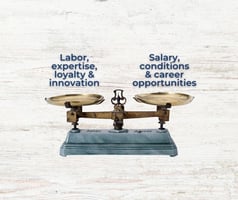Get clear so you say what you really want
How many years have gone by since you really thought about what it is that you want?
A successful pay rise negotiation needs a clear purpose. It needs the person who is proposing the pay rise (that’s you) to be super clear about what you are asking for, so that your boss can engage in a conversation about that with you, and so that as ideas are discussed, you can be clear about whether those ideas will meet your objectives and get you what you want.
One of the conversations I have with women most frequently, is around feeling okay to want what we want. Feelings of being greedy, or not needing very much, or feeling like we can’t ask for somethings are often expressed in this context. There is often reluctance to openly put what we want on the table and own it. So what is this all about?
We all spend a lot of our lives responding to money needs (need to meet the car repayments, pay the mortgage, fix the kid’s teeth) and societal needs (need to drive the right car, live in the right suburb, send the kids to the right school) that we often don’t spend very much time thinking deeply about what we personally and individually actually want. Money and societal needs are stimulated by things around us, apart from our self. Often we are reacting to something (usually some kind of standard that we feel applies) rather than stopping for a moment to think about what motivates and satisfies our self. Sometimes we don’t think about what we want because life gets really busy right? Or we are just so used to putting everyone else’s needs first, or we can sometimes be overly concerned with what others think about us and before you know it, years have gone by and you haven't stopped to take a moment to think deeply about what really matters to you.
The curious thing about that moment when you do take stock and consider what you really want, what would really make you happy, is that a lot of the time it’s not about money. A lot of the time it’s about non-money things. Perhaps it’s about being healthier, or being able to spend more time with the family, or being recognised as valuable at work or being able to experience leisure time in a more relaxed and regular way. Each of us has different personal thresholds that we respond to and in this context money becomes an enabler to living a richer and more fulfilling life, rather than an end in and of itself.
So while at the outset we want to be able to achieve a higher salary, money is often only part of the story. Taking some time to consider other things that would be of value to you, that would really make you feel wealthy, is a good investment of time because it is in this moment that the picture of what success looks like, becomes clearer. Perhaps the single biggest thing that you can negotiate for yourself is time. Or perhaps the single biggest thing you can negotiate is an opportunity to further your career.
Paul Graham (American entrepreneur) expressed it this way;
“Wealth is not the same thing as money. Wealth is the fundamental thing. Wealth is stuff we want. You can have wealth without having money. If you had a magic machine that could on command make you a car or cook you dinner or do your laundry, or do anything else you wanted, you wouldn't need money. Whereas if you were in the middle of Antarctica, where there is nothing to buy, it wouldn't matter how much money you had.”
Getting clear on what it would take for you to feel wealthy, on what you actually want, may open up interesting possibilities for you in your negotiation. Happily, freeing yourself from the money-only-blinkers also puts you in a more confident position, where you can have a wide ranging conversation with your boss.
It’s much more likely to be win/win when you know what you want.




